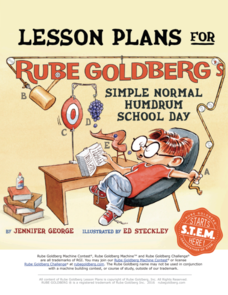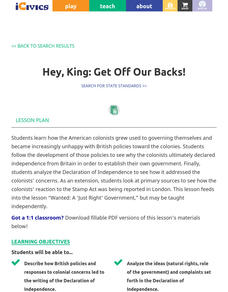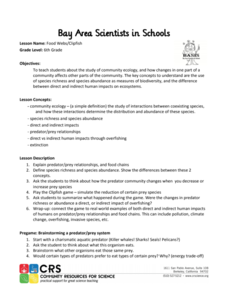National Woman's History Museum
Seneca Falls and Suffrage: Teaching Women's History with Comics
As part of the study of women's history, young scholars examine Chester Comix's strips about the Seneca Falls Convention and four 19th century leaders in the struggle for equal rights. After researching other elements of the Suffrage...
National Woman's History Museum
Create your own Women’s History Museum
Celebrate Women's History with a museum display. Divide the class into seven groups and assign each a different historical topic/time period. Each group member researches a different woman of that time period and creates an exhibit that...
National Woman's History Museum
The Path to Women’s Suffrage
The Path to Women's Suffrage unit focuses on how Western Expansion was instrumental in gaining women the right to vote through the Nineteenth Amendment. Young historians analyze maps, examine primary source documents, and create a...
Luana Game
Women in Science DIY Kit
A card game sheds light on famous women in science. Pairs or small groups collect and exchange color-coded cards. Four cards of the same color make a science lab. The first player to create three labs wins the game! Each card features a...
Purdue University
Let’s Go Outside
Nature is good for the soul. The final activity in the fine-part Family Nature Program series discusses the benefits of having an active connection with nature. Learners complete an imagery activity that relates nature to a calming...
Purdue University
Tree Talk
Examining tree rings shows more than just age. The third installment of a five-part Family Nature Program unit has learners examine all parts of trees including tree rings to tell stories about the life of the tree. They then use their...
Purdue University
Garden Surprise
View vegetables a little differently. A hands-on instructional activity begins by examining different vegetables and identifying the part of the plant they come from. Learners then create exploding seed balls they take home to grow their...
Purdue University
Chirp! Chirp!
If you build it, they will come. Young scholars learn about local birds in an interesting hands-on instructional activity. They begin by identifying birds either from photos or in nature and then build their own bird feeders. The...
Science Friday
Make a Speaker
Make science come in loud and clear. Pupils learn about how a speaker works by building one. The scholars first learn about electromagnetic fields by building an electromagnet. Using that knowledge, they build a crude speaker using a...
Science Friday
Termite Symbiosis
What happens to the wood a termite eats? Pupils learn about the three types of symbiosis with pictures of symbiotic pairs. Afterward, they determine whether there is a symbiotic relationship with a termite by dissecting termites and...
Science Friday
Fossil Detectives
What can this rock be? Pupils pretend to be paleontologists by sketching fossils and making predictions about their types. To determine whether they can identify the type of dinosaur, class members compare their observations and...
Science Friday
Pinhole Viewer
Take a peep into optics. Pupils watch a video about a large Polaroid camera before building pinhole viewers. The scholars then create different types of viewers and compare them to determine which provides the best image.
Science Friday
Colorful Chromosomes
Everything is in the genes. Individuals observe 14 different traits of themselves. Using pipe cleaners and beads, the learners create models of a chromosome representing their traits. The class then compares and contrasts everyone's...
Science Friday
Wind Power
Blow away the competition with a lesson about wind power and turbines. Groups build windmills to test how the size of blades affect the amount of work done. The scholars build a variety of blades and collect data on how each type...
Science Friday
Mineral Madness
Science does not need to be as hard as a rock. Pupils test 10 different minerals to determine their properties. The learners observe luster, streak, hardness, and fluorescence for each specimen. Afterwards, they compare and contrast the...
Rube Goldberg
Rube Goldberg's Simple Normal Humdrum School Day
If you're going to build a machine, you might as well make it interesting and amusing. A set of eight lessons and activities introduces simple machines using Rube Goldberg machines. A culminating project challenges techies to create and...
Collier County Public Schools
Women’s History Month Resource Packet
The women's suffrage movement changed the lives of future. Scholars complete hands-on activities, group discussions, posters, and conduct research to understand the importance of the push for women's right to vote. The resource packet...
Curated OER
The Bill of Rights and You
The right to life, liberty, and the pursuit of happiness. The lesson explains what the Bill of Rights is and how it applies to everyday life, like freedom of speech or the right to a jury trial. Young historians complete hands-on...
Smithsonian Institution
The American Presidency: Grades 4-6
An interesting unit explains the American presidency from the campaign trail all the way to the role of the president. Historians participate in discussions, create posters, conduct Internet research, and more to gain an understanding of...
Roy Rosenzweig Center for History and New Media
Reconstruction
When slavery ended, what did the government do to help African American during Reconstruction? An interesting instructional activity uses primary sources such as newspaper articles to help scholars analyze Reconstruction policies and how...
iCivics
Hey, King: Get Off Our Backs!
Young historians explore the reason American colonists were unhappy under British rule. Class members complete hands-on activities and participate in a group discussions to understand why colonists drafted the Declaration of Independence.
Community Resources for Science
Food Webs/Clipfish
Human impact on habitats can be alarming. A hands-on activity has learners explore the impact of human interactions with different environments using a gamified approach. They simulate the impact of a species' abundance under different...
NOAA
I Didn’t Do It…Did I?: Make Your Own Greenhouse Effect
How do greenhouse gases affect the climate on Earth? Pupils explore the concept by first building their own apparatuses to model the greenhouse effect. Then, they record data to measure temperature change and determine that the amount...
NOAA
How Do We Know?: Make Additional Weather Sensors; Set Up a Home Weather Station
Viewers learn about three different weather measurement tools in installment five of the 10-part Discover Your Changing World series. They build weather vanes to collect data on wind speed, barometers to determine air pressure, and rain...

























